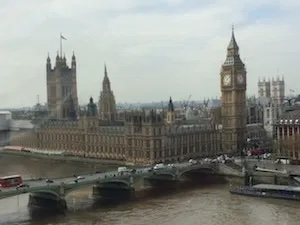Disability benefits: the choice facing MPs

Houses of Parliament. Image: ICN/JS
"The decision to include or exclude those lying wounded along the roadside can serve as a criterion for judging every economic, political, social and religious project. Each day we have to decide whether to be Good Samaritans or indifferent bystanders." (Pope Francis, Fratelli Tutti)
Members of Parliament will need to make such a decision when they vote on planned changes to the social security system which would leave millions of disabled people poorer, and some destitute.
There has been a lot of confusion and misunderstanding around these plans, which has aided the government by obscuring their potential impact. We are told that the primary motivation is to get sick and disabled people into work. But having studied the government's proposals in detail, organisations like the Joseph Rowntree Foundation say that whilst a tiny percentage of those affected may possibly be helped into work (perhaps 3 per cent at most), the rest would simply be pushed deeper into hardship. https://x.com/jrf_uk/status/1914960164802748720
The benefit which gets most media attention, Personal Independence Payment (PIP) is designed to cover the extra costs of living with an illness or disability. It is not an out-of-work benefit, and isn't affected by employment status. Many recipients use it to pay for social care or other support, some use it to help them work. The government's plans to change the eligibility criteria means that people who need help with many aspects of daily life - things like washing, going to the toilet, taking medication etc, may no longer qualify for PIP. How this could ever help them to find a job is a mystery.
The government also plans to make PIP the gateway to receiving the health element of Universal Credit (UC), which means that an unemployed person with a significant illness or disability, if they lost PIP, would also have their UC reduced to the level of a fit and healthy jobseeker. Again, how this loss of support could 'help' anyone with a chronic illness or disability to get a job is a mystery.
But it gets worse. PIP is also a 'passporting benefit' to Carer's Allowance. So, if a disabled person loses PIP, the person caring for them would lose what could be their only income.
Far from saving money, costs would simply be pushed on to the NHS and local councils, as the social security support which enables disabled people to cope and family members to care is snatched away. The disaster this represents for some families is harrowing to contemplate. Scope's Executive Director of Strategy, James Taylor, has said the proposed changes would be "a catastrophe for disabled people's living standards and independence."
In an attempt to justify the cuts, we are given the impression that spending on these benefits is 'spiralling out of control'. In fact, the Office for Budget Responsibility predicts that, as a proportion of GDP, total spending will not increase at all next year, and will then stay at the same level for the next four years. Indeed, as a proportion of GDP this spending is even predicted to be lower this year than it was for every year from 2011 to 2016. Hardly out of control. www.disabilitynewsservice.com/government-claims-of-spiralling-spending-on-benefits-are-false-and-ideological-official-figures-show/
It has been implied that significant numbers of people claiming disability benefits choose to do so because they don't want to work. We are given the impression that people are simply 'signed off sick by their GP' then automatically qualify for these benefits. In reality, there is a lengthy, rigorous, and sometimes humiliating application process. And at the end of it, the benefits received are still not enough for a minimum standard of living. Research by the Joseph Rowntree Foundation in late 2024 found that 88% of low-income families in receipt of disability benefits were already going without essentials. Who would opt to go without the essentials as a lifestyle choice? www.jrf.org.uk/social-security/where-will-cuts-to-sickness-and-disability-benefits-fall-hardest
And far from the system being abused, the New Economics Foundation has pointed out that less than half of the disabled population actually claim disability or incapacity benefits. As one would expect, the percentage who do claim is lower in wealthy areas, and higher in areas which score highly on the Index of Multiple Deprivation. This means that if the cuts go ahead, they will hit the poorest people and the poorest areas hardest, increasing inequality, and taking money out of our most deprived communities. https://neweconomics.org/2025/05/whats-behind-the-rise-in-disability-benefit-claims
Labour MPs face a stark choice: to toe the party line in pursuit of small but probably illusory savings whilst tipping sick and disabled people into poverty and destitution - or to heed their individual conscience and vote against these cuts. And if the government makes any last minute changes or concessions in order to win their vote, it's essential that MPs do not accept the government's version of any potential impact. The government's presentation of this policy has been misleading, to say the least. MPs need to seek the views of disabled people's organisations, and respected researchers such as those at the Joseph Rowntree Foundation or New Economics Foundation. It would be s disaster if they were to be misled into voting for measures which prove to be deeply harmful to their own constituents with a chronic illness or disability.
As they ponder their decision, perhaps they could consider the truth of what Pope Francis wrote in 2013:
"Just as the commandment "Thou shalt not kill" sets a clear limit in order to safeguard the value of human life, today we also have to say "thou shalt not" to an economy of exclusion and inequality. Such an economy kills." (Evangelii Gaudium)
If you would like to contact your MP to ask them to vote against these cuts, there is an easy to use form on the Trussell Trust website here: https://action.trussell.org.uk/disability-cuts


















